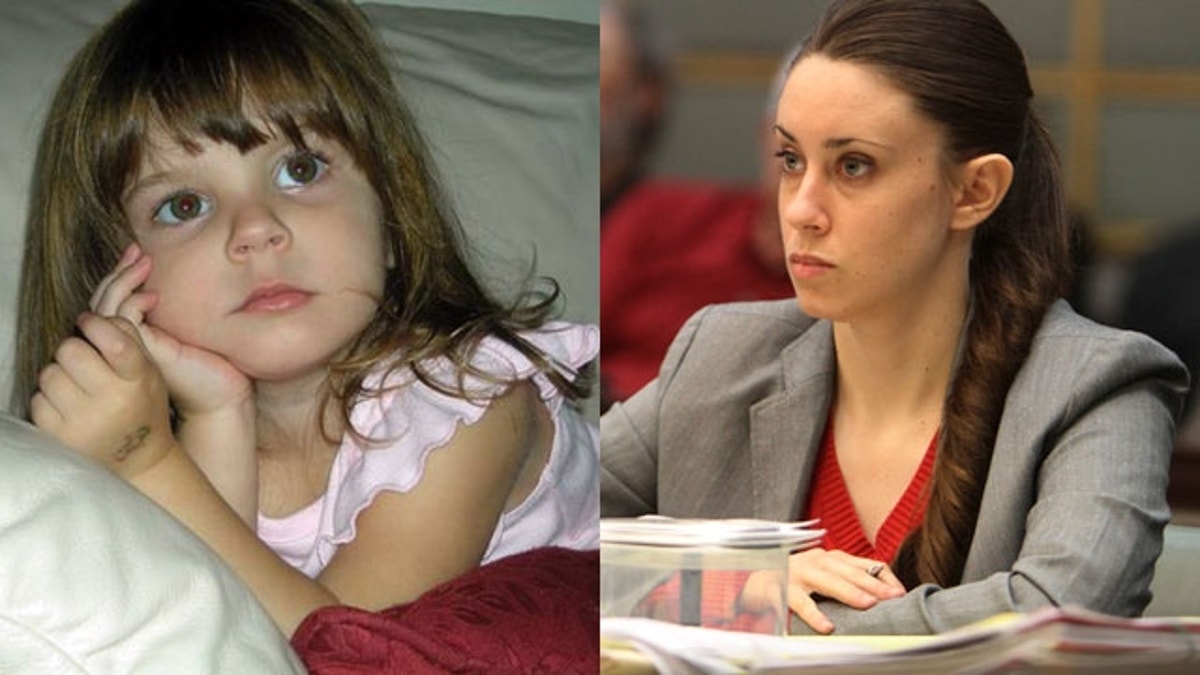
Casey Anthony, right, is on trial for the murder of her two-year-old daughter, Caylee, left. (AP)
TALLAHASSEE, Fla. -- Lawmakers outraged over Casey Anthony's acquittal have responded by proposing so-called Caylee's laws that would allow prosecutors to bring felony charges against parents who do not quickly report missing children.
The new measures were triggered, at least in part, by an online petition that had more than 700,000 signatures Friday. Some questioned whether a new law would do any good because the circumstances of the Anthony case were so rare, but lawmakers in at least 16 states have already floated proposals reacting to the verdict.
"Casey Anthony broke new ground in brazenness," said Florida state Rep. Scott Plakon, who is sponsoring the proposal in his state. "It's very sad that we even need a law like this, but Casey Anthony just proved that we do as unfortunate as that is."
In June 2008, Anthony's 2-year-old daughter Caylee was last seen at the Orlando home she shared with her mom and her maternal grandparents. For the next month, Casey Anthony, then 22, left her parents' house and spent most of her time with friends, shopping and partying, telling her family and others that Caylee was with an imaginary nanny.
Anthony's mother called detectives when Anthony could not produce her child. Anthony told investigators she hadn't called them because the nanny had kidnapped the child and she had been conducting her own search, two of the numerous lies she told investigators.
Anthony was acquitted of murder in Caylee's death, but convicted of four misdemeanor counts of lying to investigators. She was sentenced to the maximum of four years, but after serving nearly three years in jail awaiting trial, coupled with good behavior credits, she is set to go free next Sunday.
Florida's proposal would make it a felony for a parent or other caregiver to not report a child under the age of 12 missing after 48 hours. It also makes it a felony to not report a child's death or "location of a child's corpse" to police within two hours of the death.
Had Florida's measure been in place and Anthony been convicted, she could have faced another 15 years behind bars.
Other states are considering similar measures and the online petition at Change.org, started by an Oklahoma woman, calls for a federal law.
"It's certainly something that we want to look into, because right now looking at the Maryland state law we're not seeing anything that would fit the circumstances to the degree that we want to," said Joseph Cassilly, a prosecutor in Harford County, Md., which is one of the state's considering a Caylee's law.
But others think it's unnecessary.
"It only applies to people like her and fortunately those are not common everyday occurrences," said Willie Meggs, who served as a state attorney in Florida for more than three decades. "I don't think it changes anything."
When Caylee was reported missing, the sheriff's office launched a massive search, but her remains weren't discovered until six months later, near the Anthony family home. The bones were in such bad shape, prosecutors said they had difficulty collecting forensic evidence from them, making it harder to present their case to the jury.
Anthony's attorneys argued that Caylee drowned in the family pool. They said Anthony panicked and her father decided to cover up the death by making it look like murder. Anthony's lies and conduct during the month her child was missing were caused by the sexual abuse she had suffered herself as a child by her father, her attorney said.
Defense attorneys did not present evidence to support the claims regarding George Anthony, and he vehemently denied the allegations on the witness stand and said he would have done anything to save his granddaughter.
In Alabama, a bill would make it a felony for a parent, legal guardian or caretaker not to notify law enforcement authorities within an hour after the death of a child and also require parents to report a missing child within 24 hours. In Kentucky, the proposal would make failing to report a child under 12 who has been missing for 12 hours or more punishable by one to five years in prison.
Other states where lawmakers are considering such measures include Georgia, Kansas, Louisiana, New Jersey, New York, North Carolina, Ohio, Oklahoma, Pennsylvania, South Carolina, Texas and West Virginia, according to news reports.
"God forbid we ever run into a mother like Casey Anthony again," said Plakon, the Florida legislator. "If we do, that mother will be a felon."












































